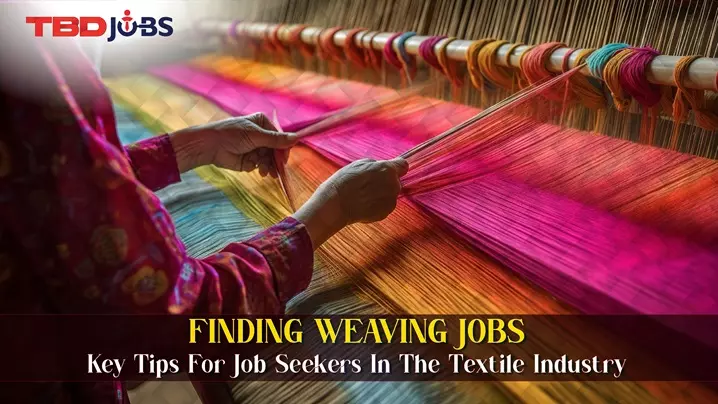Knitting has changed from an age-old craft into a major sector of the textile industry that merges artistry with technology. With the world's increasing demand for innovative and sustainable textiles, knitting industry professionals are poised to make a significant impact on the economy. There is an immense demand for knitting machine operators and managers, opening various career opportunities.
The Rise of Sustainable Practices in Knitting
The term sustainability is slowly but surely becoming a fundamental pillar in the textile industry, including knitting. The demand for natural and ethically made clothes is higher, which has allowed the industry to improve its knitting production processes. Careers in knitting nowadays involve using eco-friendly materials such as organic yarn and much more.
These changes have greatly facilitated job opportunities in knitting, where contractors not only look for practical skills but also expect the workers to present hands-on solutions to environmentally friendly textiles. Currently, knitting machine jobs require computer technology to manage energy-saving processes. On the other hand, knitting manager jobs mostly revolve around dust control and the integration of eco-friendly construction work. These positions are crucial as the industry tries to address concerns raised around production materials.
Transformative Technologies: The New Landscape of the Knitting Industry
Knitting, a traditional craft, is getting sharper through the digital swords of modernisation. Automation is changing the mould of the knitting operation to be more sophisticated. AI, real-time surveillance, and IoT-capable systems are fitted onto modern knitting machines. Reducing errors and streamlining operations marks the advanced productivity of AI automation. Current knitting operator positions require working with elevated technology and understanding sophisticated systems.
Knitting professionals must be problem solvers of automated machinery, properly functioning systems, and digital interfaces. For candidates searching for employment opportunities in the textile sector, command over digital tools and software is a prerequisite.
The Role of 3D Knitting Technology
One example of unprecedented advancement in this field is 3D knitting technology. It enables the creation of intricate designs without stitching or sewing, reducing material waste and production time. This technology is being adopted in health, fashion and automotive sectors to furnish everything from garments to medical textiles.
With 3D knitting, industry-moulded jobs featuring high-tech 3D modelling software and programming for knitting machines will increase. Anyone wishing to separate themselves from the masses will pursue these essential skills.
Emerging Trends in Knitting Jobs
Demand for Specialised Skills
The increase in the processes involved in knitting has resulted in a rise in the development of specialised skills. Knitting machine technician and knitting operator are some of the positions that require technical knowledge for the following:
- Attending to and overseeing the machinery.
- Examining the quality of the yarn.
- Formulating the patterns.
Managing knitting requires balancing and managing different groups, including team leaders or managers, for control and quality supervision. Employers look for competent people in the field with sufficient management experience.
Shift Towards Customisation
Consumer preference shifts for uncommonly customised knitted goods drive people to invest further in creating technology that specialises in customised textiles, including apparel.
This is a good trend because it invites and broadens the creative scope for skilled professionals. Nowadays, more people are involved in knitting, such as designers who invent new forms, materials, and new ways of doing old knitting.
Remote Monitoring and Maintenance
The smart paradigm allows for large sections of knitting to be done under supervision from a distance, making remote working possible. Knitting processes offer work-from-home opportunities, especially in machine work and maintenance responsibilities. With the help of the internet, professionals can ensure seamless knitted production from a wide range of locations worldwide.
Career Opportunities in the Knitting Industry
The knitting industry has a wide range of professions depending on an individual's knowledge and interests. A few notable positions are:
Knitting Operator Jobs
In this position, you will be expected to run the knitting machines and guarantee the proper functioning of all parts of the organisation's production process. An operator needs to have a good technical sense, be highly observant, and think actively and critically about organisational problems.
Knitting Machine Jobs
These employees are concerned with installing, maintaining, and repairing knitting machines. This position has become very difficult these days due to the sophisticated nature of modern machines, interconnected computers, and various other digital components that add to the complexity of machine engineering.
Knitting Manager Jobs
They are responsible for supervising the whole production process, from ordering raw materials to distributing finished goods. This is also a managerial position in which the person must be highly organised, aware of new information and market demands, and creative enough to adopt new and better work methods.
Careers in Knitting Research and Development
Knitting is one of the most processed and advanced fabrics worldwide. Therefore, working with and knitting fabrics, developing new yarns, designing more efficient machines, and finding new uses for knitted textiles provide countless opportunities for researchers and developers.
How TBD Jobs Can Help You Excel in the Knitting Industry
TBD Jobs aims to connect talented professionals with employers in the knitting industry. TBD Timber has a commendable range of textile jobs, whether you are an experienced knitting manager or just a knitting operator.
TBD develops knitting industry managers; therefore, career growth opportunities always exist within our job listings, including roles in leading companies that embrace the latest trends and technologies.
By partnering with TBD Jobs, you gain access to:
- Exclusively tailored career-defining prospects
- Insight into the knitting industry, news and events
- Focused self-improvement opportunities
Let TBD be your partner in building a promising future in knitting and fulfilling milestones in your career.
Preparing for the Future: Skills to Focus On
These skills enhance personal and organisational outcomes in the futuristic job environment.
- Technical Proficiency: Understanding modern knitting machines, software, and other tools of modern knitting.
- Knowledge of Sustainability: Knowledge about eco-friendly practices and materials.
- Creative Solving: Capabilities to invent and customise design solutions.
- Data Analytics: Capability of analysing production data and identifying processes requiring optimisation.
- Leadership and collaboration: Comprehensive leadership and collaborative skills for the employed in managerial positions.
Conclusion
Knitting jobs are set to flourish in the coming years due to factors such as sustainability, digital transformation, and customisation. A wealth of opportunities is available, from knitting operator roles to managerial positions, and those passionate about textiles will find the industry welcoming. One can build a solid career in the industry by keeping pace with innovations and acquiring the right skills.














.webp)













Leave a Comment
5 Comments
29 Sep 2025, 08:18 AM
26 Dec 2025, 03:38 PM
01 Oct 2025, 07:05 PM
17 Oct 2025, 05:39 PM
12 Dec 2025, 09:29 AM